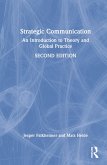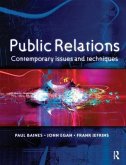Workplace Communication highlights how we can build interpersonal relationships through effective communication and why this is essential to workplace wellbeing. Well-supported by contemporary, reputable empirical studies, the book also comes with exercises and open-ended questions based on the subject matter. The book provides a comprehensive overview on creating an inclusive workplace and managing workplace diversity; covers a wide range of salient, up-to-date reputable literature on a wide range of management and business topics; contains practical, 'road-tested' activities to promote student reflection, experiential learning, critical thinking, research skills, and application of theory to practice and vice versa; examines how we communicate effectively to an increasingly diverse workforce. Designed for a broad audience, this book will appeal to academics and students in the fields of business management and communications. It will also be a useful reference for organisational practitioners and leaders.
Hinweis: Dieser Artikel kann nur an eine deutsche Lieferadresse ausgeliefert werden.
Hinweis: Dieser Artikel kann nur an eine deutsche Lieferadresse ausgeliefert werden.
'Workplace Communication by Joanna Crossman is written in a well-organized manner: readers benefit from its rich contents, interesting examples, as well as contrasting similarities and differences. It brings together latest research findings from psychology, sociology, organizational behaviors, linguistics, and critical studies to shed insights on workplace communication patterns. It can be used as a text for upper class undergraduate program or master program of human resources management, communication, as well as organizational psychology.'
Kara Chan, Professor of Communication Studies and Associate Dean (Teaching & Learning), School of Communication and Film, Hong Kong Baptist University
'This book takes an innovative approach to contemporary communication challenges. It covers essential communication concepts and applies them to the context of diverse stakeholders in the workplace. Of particular interest to readers will be the chapters on intercultural and spiritual diversities. The majority of workplaces struggle with intercultural and multilingual communication and spiritual diversity can often be the elephant in the room. Dr. Crossman effectively handles these issues in the book and deftly incorporates research and practice implications for workplace communication.'
Sarbari Bordia, Professor, Research School of Management, Australia National University, Australia
'This book represents a timely publication as the workplace is becoming increasingly multicultural. It also provides the reader with a solid reference in Part 2 to intercultural theories and dimensions that are crucial for interactions and communication in the multicultural workplace.
Other chapters of this book cover additional topics with relevant theories that are focussed upon the workplace contexts such as conflict resolution, interpersonal communication, emotion at work and ethical approaches for building relationships. What is also appealing is the communication and language perspective for managing workplace diversity and conflicts and negotiation as a value-adding process.
I recommend that this book is of great relevance for both academics and practitioners to have a better understanding of communication as an important approach to not only managing organizational diversity but also contributing to a positive ambience and culture at the workplace.'
Yunxia ZHU, Associate Professor at University of Queensland, Australia and Vice President (Chairperson) of the Asian Pacific Region of Association for Business Communication
Kara Chan, Professor of Communication Studies and Associate Dean (Teaching & Learning), School of Communication and Film, Hong Kong Baptist University
'This book takes an innovative approach to contemporary communication challenges. It covers essential communication concepts and applies them to the context of diverse stakeholders in the workplace. Of particular interest to readers will be the chapters on intercultural and spiritual diversities. The majority of workplaces struggle with intercultural and multilingual communication and spiritual diversity can often be the elephant in the room. Dr. Crossman effectively handles these issues in the book and deftly incorporates research and practice implications for workplace communication.'
Sarbari Bordia, Professor, Research School of Management, Australia National University, Australia
'This book represents a timely publication as the workplace is becoming increasingly multicultural. It also provides the reader with a solid reference in Part 2 to intercultural theories and dimensions that are crucial for interactions and communication in the multicultural workplace.
Other chapters of this book cover additional topics with relevant theories that are focussed upon the workplace contexts such as conflict resolution, interpersonal communication, emotion at work and ethical approaches for building relationships. What is also appealing is the communication and language perspective for managing workplace diversity and conflicts and negotiation as a value-adding process.
I recommend that this book is of great relevance for both academics and practitioners to have a better understanding of communication as an important approach to not only managing organizational diversity but also contributing to a positive ambience and culture at the workplace.'
Yunxia ZHU, Associate Professor at University of Queensland, Australia and Vice President (Chairperson) of the Asian Pacific Region of Association for Business Communication








